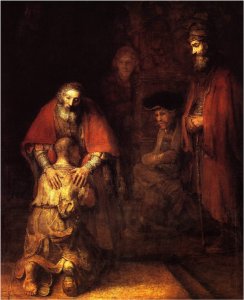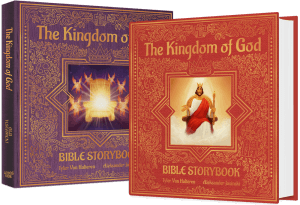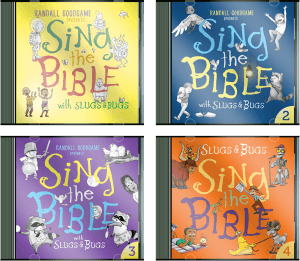More than 100 people have died in Maui from the most devastating U.S. wildfire in the last century. A once thriving village is reduced to ashes, leaving many more residents homeless. For some, this might conjure biblical imagery. And there may be no figure in Scripture who relates to that more than the prophet Jeremiah.
It’s not very common to see a grown man cry in today’s culture, but there are experiences in life that just bring us to tears — no matter how tough you are. Known as “The Weeping Prophet,” much of the book of Jeremiah can be like that.
But why would we want to open up a book that is about shedding tears? Shouldn’t we focus on joy?

I have often found that in the midst of our darkest moments, brighter beams of hope also shine through. That’s what we find in Jeremiah. In the darkest moments, for Israel, God sent a way of escape, promising new life and new hope, and proving that sadness and sorrow will not have the last word.
The famous Dutch painter Rembrandt has a portrait of the great prophet Jeremiah leaning to one side, resting sorrowfully on his left arm and looking forlorn. Rembrandt is notorious for capturing the encroaching darkness around the outsides of his portraits, along with brighter yellowish light fixed in the center.
That’s the first thing to learn when approaching the book of Jeremiah: the reality of the darkness around the edges. Sometimes, we ignore the darkness and also miss the bright hope and light that breaks through. It ultimately centers on the hope that centers on God always showing up.
That leads us to one of the first lessons the prophet teaches us.
Lesson 1: Remember Our First Love!
After the prophet’s call from God, Jeremiah’s opening scene is a vivid memory. The Lord is remembering Israel as his bride:
“I remember the devotion of your youth, how as a bride you loved me and followed me through the wilderness.” Jeremiah 2:2
How the Lord loved this brand new nation, brought up out of Egypt. And Israel loved him back with undivided devotion! If you have known the Lord for a few years, remember back with me what it was like to first know the Lord. Reading Scripture would have been like reading daily love letters!
H. A. Ironside — the late pastor and evangelist at Moody Church — in his commentary on Jeremiah remembers the beauty of the first love we have for our savior.
“How much (The Lord) was to us then!” Ironside writes “What a poor thing this world seemed with all its glittering baubles! How gladly we turned from everything we had once delighted in to go out after Himself revealed in Jesus!” I think of Revelation 2 that calls us as Christians to “remember our first love!”
But we need these reminders, Israel needed these reminders. Too often, we forget God’s love. We turn away to other loves and look for joy in forbidden places.
In Jeremiah’s day, one of the daily threats was starvation. Food in the ancient world was always in short supply. Nowadays we can run out to a supermarket and never lack breads, meats, and every kind of food to choose rom. If there is a drought, like the farmers in Central California have experienced in recent years, it may drive up the cost of our food, but we almost never run out.
But in the ancient world, in Jeremiah’s world, hunger was an all-too-frequent friend. And when hunger strikes people will do anything to get food.
Which leads us to our second lesson: when we are desperate, we often turn to other sources of love to provide for us.
Lesson 2: Sin Separates Us from God
Sin. It’s not a popular word. But it is the word the Bible uses for straying and missing the mark of what the Lord commands. He calls his bride to have undivided devotion to him, but so frequently we go our own way.
In Jeremiah’s day there was no water. On a diet of bread and fruit, the staples of Israel, no water meant no food. No food meant famine. And famine meant hunger.
The Lord describes the desperation that his young bride had when she wandered away from him like this.
“My people have committed two sins: They have forsaken me, the spring of living water, and have dug their own cisterns, broken cisterns that cannot hold water.” Jeremiah 2:13
Picture pouring water into the top of a cup, the only problem is there is a shattered hole on the bottom of the cup and everything you pour into it just comes flowing out the bottom. This is what trusting foreign gods is like.
Israel had stored up her life in the wrong place. She believed that these foreign gods would protect her, she believed an allegiance to them would save her. But they betrayed her and she was left alone, deceived, and forgotten.
Have you felt like that? You put all your hope in a relationship, in a business, even in a child, and they let you down. Israel stored her life in cisterns, broken cisterns, and it all flowed away.
This is the darkness I mentioned above. Sometimes the darkness and hopelessness in our life is caused by others; we are betrayed by a person we thought was our friend, or our a loved one is diagnosed with cancer. But, sometimes the only person to blame is me, and whatever the case may be, there is only one way back to the Lord.
We must cry out for deliverance. “Save us, O Lord! Save us.” Jeremiah 31, which in many ways is the very heart of the book, has a cry very much like this.
“I have surely heard Ephraim’s moaning. You disciplined me like an unruly calf, and I have been disciplined. Restore me, and I will return, because you are the Lord my God.” Jeremiah 31:18
The Bride of the Lord who had given herself to foreign gods and was now left alone and betrayed, comes back to him with only one hope, “You are the Lord my God.”
Then finally, I want to point you to Jeremiah’s third lesson of the Lord’s response. How does the Lord react when he hears us come back to him alone and needy?
Lesson 3: “I still remember you”
Remembering – all throughout the Bible – refers to an intimate knowledge of someone. Not as much like remembering something mundane, but more like remembering a beautiful day with the person you love.
C. S. Lewis, in his first work of science-fiction called “Out of the Silent Planet” wrote, “a pleasure is not full grown until it is remembered.” This is the way the Bible uses the word, remembrance. It is savoring and enjoying an experience that has changed you and you will never be the same again. It is a memory full grown and enjoyed.
This is the way the Lord responds when he hears the cry of his son.
“Is not Ephraim my dear son, the child in whom I delight? Though I often speak against him, I still remember him. Therefore my heart yearns for him; I have great compassion for him,” declares the Lord. Jeremiah 31:20
The Lord extends these words to everyone who cries to him for mercy. Is not Ephraim my dear son?
I can’t help but think of the story of another young son, also captured in a famous Rembrandt painting, who wasn’t sure if his father would remember him.
 This young son had grown up with all the joys and privileges of belonging to a father who loved him. But in his adolescence he hardened his heart and asked for all the inheritance from his father in advance. The father divided his possessions and gave them away to his loved son. Then the son ran away to a far off land.
This young son had grown up with all the joys and privileges of belonging to a father who loved him. But in his adolescence he hardened his heart and asked for all the inheritance from his father in advance. The father divided his possessions and gave them away to his loved son. Then the son ran away to a far off land.
The story tells us that there was a famine in that land; everyone was experiencing the pain of hunger. It may seem like a coincidence that the son running away from this father ended up in this famine. But I don’t think so. I think the Lord of this story is reminding us in the famous story of the prodigal son of the many times when Israel ran away from him and ended up in famine.
But now do you recall what the son said to himself? “How many of my father’s hired servants have food to spare, and here I am starving to death!” The first acknowledgement of the son is that the father’s house is the only place where he can find life. “I will set out and go back to my father and say to him: Father, I have sinned against heaven and against you. I am no longer worthy to be called your son; make me like one of your hired servants.”
But the question for our passage in Jeremiah 31 is, “will the Father remember him?” Will the father take him back? Now the story of the prodigal son switches camera angles and we are placed back in the position of a father left only with one son. While the younger son is still far away, the father might have to squint to see him, something about this stranger, something about the way he walks, something about this person far, far away prompts the father to jump to his feet. He doesn’t wait for his son! He doesn’t walk towards his son. He doesn’t even slowly jog to him. He runs!
The Father runs. And the story gives us one simple reason. “He was filled with compassion.” He throws his hands around him and kisses him. What a lavish way of loving a son who had taken everything from him! What a divine love this is that shows only mercy and kindness to one who had betrayed him.
You see, the reason the Father could love his son like this is because of a New Covenant he had promised to make, all the way back in Jeremiah 31. This covenant says, “I will forgive their iniquity, and I will remember their sin no more.”
How is this new covenant sealed? What is the guarantee of this new covenant? Israel, or in Jeremiah 31, Ephraim is described as God’s son. In the famous parable of the prodigal son we have another father son relationship. But they are all pictures and point to THE Father-Son relationship that changed history. Jesus raised a cup with his disciples one dark night and said, “This cup is the New Covenant in my blood.”
Jesus, who was the son who always obeyed the Father, was given over to death for our sins, for those which had separated us from God. Our sinfulness really is so bad that the eternal Son of God had to be nailed to a cross for us. But the covenant that his blood seals is an everlasting covenant, and it promises that God will always remember — this special word of love and relationship — he will always remember his people.
This is the hope that shines in our darkness. Though sorrows and sadness seem to reign in this life, this is the bright hope that shines, even on the pages of Jeremiah and in Maui after a devastating wild fire. It is the hope we need today.
ABOUT THE AUTHOR
As the leader of the Haven Ministries, Charles Morris is always thinking of ways to lead Christians and non-Christians to Christ—hence the familiar slogan, “Telling the great story … it’s all about Jesus.” A former secular journalist, Charles has worked for United Press International, and as a press secretary for two former U.S. senators. He and his wife, Janet, have authored several books, including Missing Jesus. Charles’ latest book is Fleeing ISIS, Finding Jesus: The Real Story of God At Work.
 THE KINGDOM OF GOD BIBLE STORYBOOK: BOX SET
THE KINGDOM OF GOD BIBLE STORYBOOK: BOX SET


 This young son had grown up with all the joys and privileges of belonging to a father who loved him. But in his adolescence he hardened his heart and asked for all the inheritance from his father in advance. The father divided his possessions and gave them away to his loved son. Then the son ran away to a far off land.
This young son had grown up with all the joys and privileges of belonging to a father who loved him. But in his adolescence he hardened his heart and asked for all the inheritance from his father in advance. The father divided his possessions and gave them away to his loved son. Then the son ran away to a far off land.


